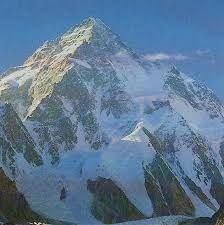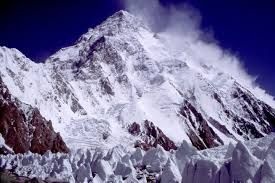![K2 [Credit: ]](http://media-2.web.britannica.com/eb-media/14/75514-004-D58D13AE_fa_rszd.jpg) the world’s second highest peak (28,251 feet [8,611 metres]), second only to Mount Everest. K2 is located in the Karakoram Range and lies partly in a Chinese-administered enclave of the Kashmir region within the Uygur Autonomous Region of Xinjiang of China and partly in the Gilgit-Baltistan portion of Kashmir under the administration of Pakistan.
the world’s second highest peak (28,251 feet [8,611 metres]), second only to Mount Everest. K2 is located in the Karakoram Range and lies partly in a Chinese-administered enclave of the Kashmir region within the Uygur Autonomous Region of Xinjiang of China and partly in the Gilgit-Baltistan portion of Kashmir under the administration of Pakistan.
The glacier- and snow-covered mountain rises from its base at about 15,000 feet (4,570 metres) on the Godwin Austen Glacier, a tributary of the Baltoro Glacier. The mountain was discovered and measured in 1856 by Col. T.G. Montgomerie of the Survey of India, and it was given the symbol K2 because it was the second peak measured in the Karakoram Range. The name Mount Godwin Austen is for the peak’s first surveyor, Col. H.H. Godwin Austen, a 19th-century English geographer.
The first attempt to reach the summit was made by an Anglo-Swiss expedition in 1902 that ascended to 18,600 feet (5,670 metres) on the peak’s northeastern crest. Other unsuccessful attempts included an Italian expedition in 1909, led by Luigi Amedeo, duke d’Abruzzi, via the southeastern ridge (later called the Abruzzi Ridge) that reached approximately 20,000 feet (6,100 metres). In 1938 an American expedition led by Charles Houston via the Abruzzi Ridge reached about 26,000 feet (7,925 metres); in 1939 another American-led expedition following the same route reached about 27,500 feet (8,380 metres); and in 1953 another expedition led by Houston reached 25,900 feet (7,900 metres) on the Abruzzi Ridge. Finally, in 1954, an Italian expedition consisting of five scientists (including the geologist Ardito Desio as leader), a doctor, a photographer, and 12 others, including a Pakistani, managed to conquer the Abruzzi Ridge despite the severe weather conditions. The summit was reached at 6 pm on July 31, 1954, by Achille Compagnoni and Lino Lacedelli. In the course of the ascent, Mario Puchoz, one of the guides, died of pneumonia.
Because K2 is prone to frequent and severe storms that make the already treacherous climbing conditions on its slopes even more challenging—and humans find functioning at such high elevations difficult—it is one of the world’s most difficult mountains to climb. The number of people to have reached the top constitutes only a small fraction compared with how many have successfully climbed Mount Everest. In addition, although there have been fewer deaths on K2 compared with those on Mount Everest, the proportion of those killed to the number of people who have attempted climbing K2 is significantly higher.





